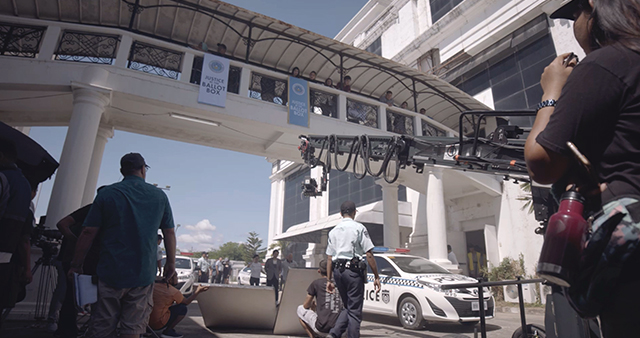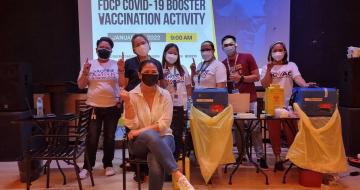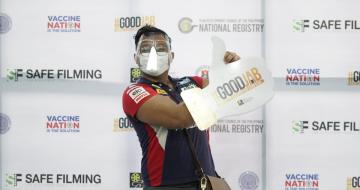Safe Filming Guidelines Put a Premium on Film and AV Workers

As work has resumed in the film and audiovisual (AV) industry, the Department of Health (DOH), Department of Labor and Employment (DOLE), and Film Development Council of the Philippines (FDCP) want to remind stakeholders that the health and safety of workers must be paramount.
That is why the FDCP, DOLE, and DOH collaborated to issue Joint Administrative Order (JAO) No. 2020-001 on the Health and Safety Protocols on the Conduct of Film and Audiovisual Productions Shoots and Audiovisual Activities During COVID-19 Pandemic.
The FDCP-DOLE-DOH Joint Administrative Order No. 2020-001 provides filming guidelines not only to protect workers but ultimately, to support the industry as it strives to recover from the setbacks caused by the pandemic. The provisions were created with the well-being and welfare of film and AV workers in mind—the health of workers, smooth operations of productions, and a virus-free industry.
Stakeholders can draft their protocols and submit these proposals to the Safe Filming Program provided by the FDCP-DOLE-DOH Joint Administrative Order No. 2020-001. Once the proposals are deemed compliant with the JAO’s provisions, then they will be endorsed officially.
The following are clarifications on the most frequently asked questions about the FDCP-DOLE-DOH Joint Administrative Order No. 2020-001:
1. Why does the JAO cover all AV industry sectors and not just film?
The FDCP’s mandate may be for the film industry, but government agencies can release joint orders to streamline and ensure full coverage of policies and guidelines especially if these involve intersecting and inter-sectoral concerns and mandates.
According to the Department of Trade and Industry (DTI) Memorandum Circular 20-22, motion picture, video, and television program productions are the only sectors that were mentioned as allowed to operate under Modified Enhanced Community Quarantine conditions. In order to include other audiovisual sectors not mentioned by the DTI, the FDCP provided context to the DOH and DOLE as to the varying formats of content creation within the audiovisual industry.
As the FDCP recognizes its limitations in terms of its mandate and exercise of its function, it partnered with regulatory agencies such as the DOH and DOLE that cover all sectors, ensuring the implementation of filming guidelines for all AV workers in congruence with health, safety, and labor measures.
2. Is the FDCP overreaching in its mandate by including live events in the JAO?
While FDCP’s mandate does not include live events, the DOLE and DOH signatories in the FDCP-DOLE-DOH Joint Administrative Order No. 2020-001 enable the coverage of all sectors as long as their activities fall under production shoot activities. Only events and panels filmed at a production site without a live audience will be covered, excluding events held virtually such as video conferences.
3. Why do AV productions have to register with the FDCP?
Productions need to seek approval from the concerned local government units (LGUs) of their locations, and this is a must even before the pandemic. As for the FDCP, DOLE, and DOH, they need to know the locations of the production shoots to monitor compliance with the health and safety protocols and for better contact tracing in the event of an infection in the production site.
Only AV productions that involve crew members working on a production site are required to register and submit reports. Productions need to submit their accomplished forms to the FDCP seven (7) days before the cameras start rolling so that it can transmit the information to the DOH, DOLE, and LGUs which are under the Department of the Interior and Local Government (DILG).
4. Why should there be an OSH officer in all AV production sites?
Under the Occupational Safety and Health (OSH) Law, it is mandatory to have an OSH officer in a production site at all times. The OSH officer should have undergone training as prescribed by the DOLE. The number and types of OSH officers will depend on the activities and number of workers.
The OSH officer will conduct an ocular inspection and institute control measures in the workplace, hold a health and safety orientation for all workers before the start of the production, ensure that health and safety protocols are in place, and serve as the Incident Management point person should there be a suspect, probable, or confirmed COVID-19 case in the production site.
5. Does the JAO encroach on filmmakers’ freedom of expression?
Absolutely not! The submission of scripts was never part of the production registration requirements.
Just as banks and restaurants ask for basic information from clients these days, the same will be required for workers in production sites to aid in contact tracing, if needed. All information will be treated with utmost confidentiality and will not be used for purposes outside of the FDCP-DOLE-DOH Joint Administrative Order No. 2020-001.
The Safe Filming Registration Forms will serve as monitoring tools. The Project Registration Form needs some details of the production, including the number, names, and contact details of on-site workers as well as the project’s planned exhibition platforms. The Health and Safety Commitment Declaration Form signifies that productions have read and understood the provisions of the FDCP-DOLE-DOH Joint Administrative Order No. 2020-001.
The forms must be e-mailed to the Safe Filming Program, and the Safe Filming team will confirm the registration and provide other pertinent forms along with the Safe Filming Manual. Productions can then conduct their shoots provided that they adhere to the FDCP-DOLE-DOH Joint Administrative Order No. 2020-001, which was signed with immediate effectivity on June 7.
These clarifications were made known officially via a joint statement from the FDCP, DOLE, and DOH which was issued on July 30, 2020. On the same day, the Department of the Interior and Local Government (DILG) endorsed the FDCP-DOLE-DOH Joint Administrative Order No. 2020-001 to all LGUs through Memorandum Circular (MC) No. 2020-107 signed by DILG Secretary Eduardo Año.




